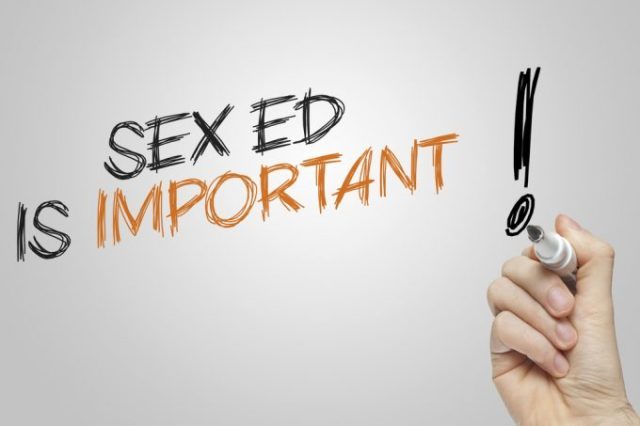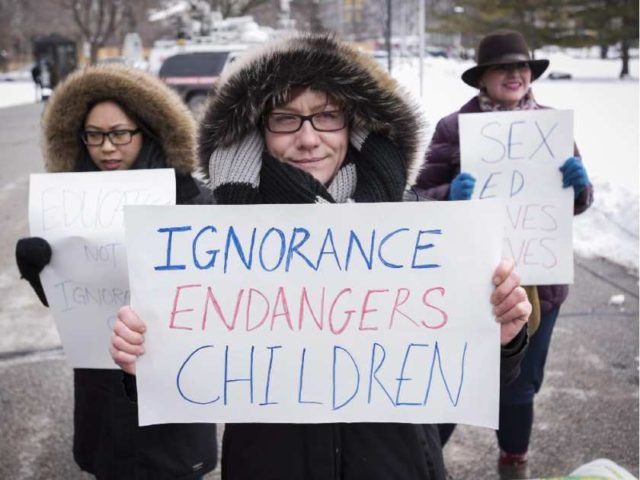“The first time my boyfriend and I had sex, we decided to use a condom. And that was the limit to our knowledge of safe-sex. We didn’t even know where my vagina was located, we didn’t know how to put a condom on an erect penis, we didn’t even know about proper lubrication and how badly it is required.”
– (Name undisclosed)
It is good that they decided to educate themselves on it, else it would have led to injuries or unwanted pregnancy which would have the worst repercussions both from the society and the family.
Sex education is often mistaken as one chapter in ninth standard biology textbooks, reading which a classroom would secretly giggle.
When it comes to sex, every possible space for a dialogue is censored – classrooms, dining rooms, sometimes even bedrooms.
A sex survey conducted by India Today marks this generation as the most sexually liberal.
How can you imagine that sexual liberation can go without sex education? It already sounds catastrophic.
Sexual desires are natural, but sex education is not innate. Just like any other subject, it has to be understood, taught, and implemented. Remember Kamasutra?
With such a boom where Indians are coming to terms with their sexuality, the country is definitely in need of Compulsory Sexual Education.
Let us guide you to this need of the hour. Step-by-step, shattering one taboo after the other.
What is CSE, actually?
The International Planned Parenthood Federation (IPPF) is an international non-governmental organisation whose aim is to promote sexual and reproductive health.
IPPF has a rights-based approach to CSE. According to IPPF, sexual education helps “to equip young people with the knowledge, skills, attitudes and values they need to determine and enjoy their sexuality – physically and emotionally, individually and in relationships.”
In a way, it does not only include the act of intercourse but also covers areas that are never talked about – child abuse, child rapes, sexually-transmitted diseases, among others.
Current situation of CSE in India
The IPPF puts it very simply – denying adolescents the right to have knowledge about sex creates a “fool’s paradise”.
If a right to life is guaranteed, the absence of sexual education exposes the youth to greater dangers. In that case, the government itself is endangering the lives of its future assets.
How important is CSE in India?
India has the largest adolescent population (over 250 million). And we are putting such a number at risk.
In October 2015, the Indian Journal of Psychiatry published a report on adolescent sex education in India. Here is what they came up with:
1. Adolescents in the age group of 15–24 years contribute to a disproportional 31% of AIDS burden in India.
2. Healthcare professionals often lack the knowledge themselves which impacts information imparted to the adolescent population who seek it.
3. Complications arising from pregnancy and unsafe abortions are a leading cause of death among women aged 15–19 years, with 20% of the group experiencing childbearing before 17 years of age, with pregnancies often closely spaced. The risk of maternal mortality among adolescent mothers stands twice as high that of mothers aged 25–39 years.
4. 53% of boys and 47% of girls till the age of 18 years are survivors of sexual abuse in India.
We are putting a very delicate population at the maximum risk.
What can be done?
Since we are a still highly conservative society, introducing sex education is certainly not easy.
Internet spaces have to be penetrated. Pornography is not sex education, rather it is highly ignorant of the topic.
However, there are organisations like Love Matters India which is doing a brilliant job in providing an open platform for the youth where they can not only learn about various sex education related topics but can also place their questions to be answered without any bias. This is a significant way to respond to the paranoia against sex education.
There is a large rift between education and practice.
The absence of CSE is only preparing our future generations for more blunders, for more health risks which might lead to a permanent state of psychological trauma.
Image Credits: Google Images
Other Recommendations:
http://edtimes.in/2017/03/debunking-taboos-that-consider-sex-education-paap-in-india/
Winternship Partners:
Love Matters India is an online platform that provides blush-free information and news about sexuality and sexual health for 18 to 30-year-olds in India. They are the first bilingual (English and Hindi) sexual health website in India with open, honest and non-judgmental attitude towards all topics related to love, sex, relationships and everything in between. Don’t forget to follow them on Facebook, Twitter, Instagram and YouTube.
SheThePeople is a video story telling space that inspires women, strengthens their efforts, exchanges leadership ideas, fosters networking and reinforces their ability to contribute to growth. Through their special videos on SheThePeople.TV they are presenting the modern Indian woman a platform to discuss and share the challenges faced by this up-tapped leadership community. Don’t forget to follow them on Facebook and Twitter.
Twitter brings you closer to what you care about. Get on an exclusive chat with Twitter’s Aneesh Madani through ED. Follow him @aneeshmadani.
The Harvard US India Initiative aims to empower the youth and promote awareness about India’s most pressing issues. Don’t forget to follow them on Facebook.
Social Samosa is the only online publication reporting trends, insights and breaking stories on social media marketing.





































